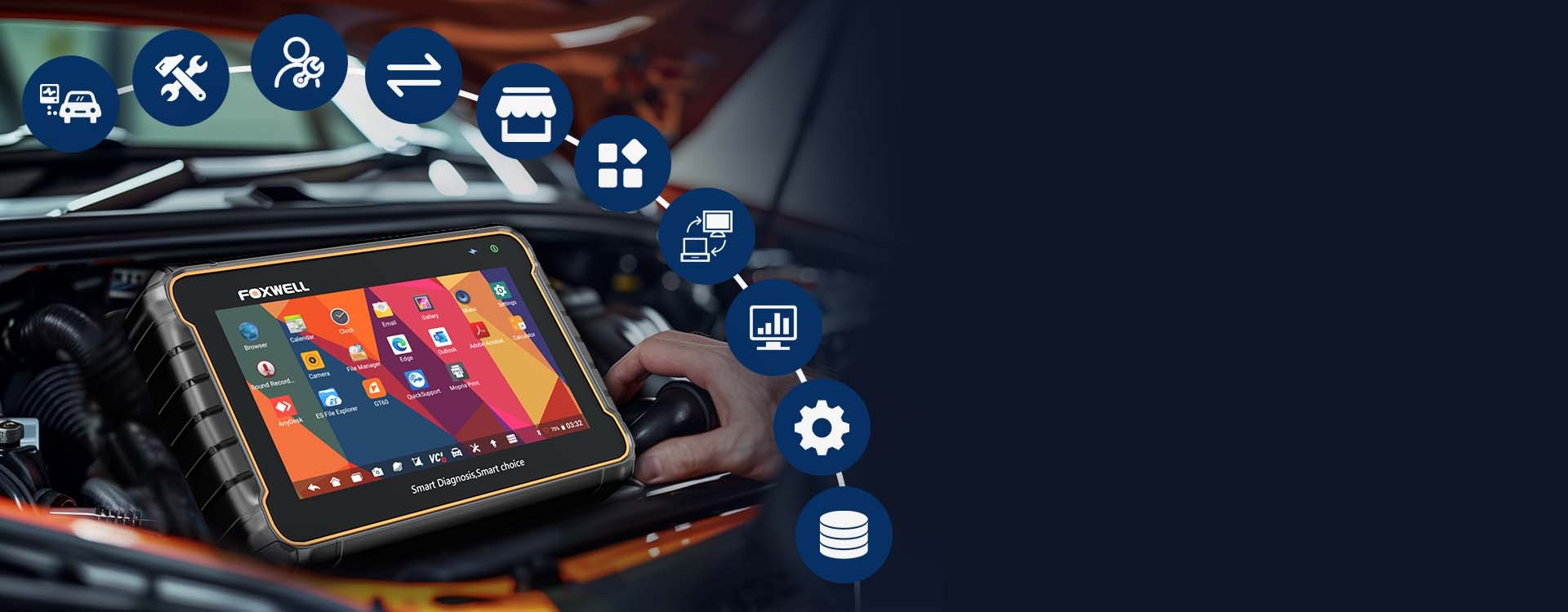Many car owners utilize OBD2 scanners for vehicle diagnostics and performance monitoring. These handy devices plug into your car’s OBD2 port to provide valuable insights into your vehicle’s health. However, a common concern arises: does leaving an OBD2 scanner plugged in drain your car battery?
This article delves into the relationship between OBD2 scanners and battery drain, exploring the circumstances under which it can occur and providing actionable strategies to prevent it. We aim to give you a comprehensive understanding so you can confidently use your OBD2 scanner without worrying about a dead battery.
Understanding OBD2 Scanner Power Consumption
To understand the potential for battery drain, it’s crucial to know how OBD2 scanners operate. These devices draw power directly from your vehicle’s OBD2 port. Even when your car’s engine is off, the OBD2 port can remain active, supplying power to connected devices.
The power draw of an OBD2 scanner is generally minimal, often comparable to the energy consumed by other low-power systems in your car, such as the alarm system or onboard computer. However, even a small continuous draw can become significant over time, especially if your car is not driven regularly.
If an OBD2 scanner is left connected for extended periods, it essentially acts as a parasitic load on your car battery. While the drain might be slow, it’s a consistent drain that can lead to issues, particularly if your battery is older or not in optimal condition. The risk is further amplified in vehicles where the OBD2 port remains powered even after the ignition is turned off.
The Battery Drain Dilemma: When is it a Real Concern?
The question isn’t just “can OBD2 scanners drain batteries?” but rather “under what circumstances is battery drain a significant concern?”. The answer largely depends on a few key factors:
-
Vehicle Design: Some vehicles are designed to automatically shut off power to the OBD2 port when the ignition is off. In these cars, the risk of battery drain from an OBD2 scanner is significantly reduced, if not eliminated. However, many modern vehicles, especially newer models with advanced electronics, keep the OBD2 port powered continuously. This means that a connected OBD2 scanner will always be drawing power, even when the car is parked.
-
Scanner Type: The type of OBD2 scanner also plays a role. Basic scanners with limited features generally consume less power than advanced models. Scanners equipped with features like Bluetooth, Wi-Fi, or large displays tend to have higher power consumption. These advanced features can remain active even when the vehicle is off, further contributing to battery drain.
-
Battery Health: The condition of your car battery is a critical factor. A healthy, newer battery is more resilient and can withstand a small parasitic drain for a longer period without significant issues. However, older or weaker batteries are more susceptible to drain. If your battery is already nearing the end of its lifespan, even a minimal drain from an OBD2 scanner could be enough to cause problems, especially in cold weather when battery performance naturally decreases.
-
Usage Frequency: If you drive your car daily, the alternator will regularly recharge the battery, offsetting any minor drain from a connected OBD2 scanner. However, if your vehicle is parked for days or weeks at a time, the continuous drain from the scanner can become problematic, especially if combined with other factors like an always-powered OBD2 port and a slightly older battery.
Long-Term Connection: The Cumulative Effect
While the power consumption of a typical OBD2 scanner is low, the impact of long-term connection is cumulative. Leaving a scanner plugged in for weeks or months, especially in vehicles with continuously powered OBD2 ports, can lead to a noticeable battery discharge.
This slow, consistent drain can have several negative consequences:
-
Battery Weakening: Repeatedly draining and recharging a car battery, even slightly, can shorten its overall lifespan. Deep discharges, even if not fully depleting the battery, can contribute to sulfation and other forms of battery degradation.
-
Starting Issues: The most immediate and noticeable effect of battery drain is difficulty starting your car. If the battery voltage drops too low, it may not have enough power to crank the engine, leaving you stranded.
-
Electronic System Glitches: In some cases, low battery voltage can cause glitches in your car’s electronic systems. This might manifest as warning lights, erratic sensor readings, or even issues with features like power windows or door locks.
For vehicles that are not driven frequently, or those with older batteries, the risk of these long-term effects is amplified. It’s crucial to be mindful of the potential cumulative impact of leaving an OBD2 scanner constantly connected.
Practical Strategies to Prevent OBD2 Battery Drain
Fortunately, preventing OBD2 scanner battery drain is straightforward. By adopting a few simple best practices, you can enjoy the benefits of your scanner without compromising your battery health:
-
Unplug When Not in Use: The simplest and most effective solution is to unplug your OBD2 scanner whenever you are not actively using it. While it might seem slightly inconvenient, this ensures that no power is being drawn from your battery when your car is parked. Make it a habit to unplug the scanner after each diagnostic session.
-
Utilize Scanners with Auto Shutoff: Consider choosing OBD2 scanners that are equipped with automatic shutoff or sleep mode features. Many modern wireless scanners and some advanced wired models are designed to power down automatically when the engine is turned off or after a period of inactivity. These features significantly reduce the risk of battery drain, even if you forget to unplug the scanner.
-
Opt for Low-Power Scanners: When selecting a scanner, be mindful of its power consumption. Basic OBD2 scanners without extra features like Bluetooth or Wi-Fi generally consume less power. If battery drain is a major concern, especially if you plan to leave a scanner plugged in for monitoring purposes, choosing a low-power model is a wise decision.
-
Regular Battery Health Checks: Maintain a healthy car battery. Regularly check your battery’s condition, especially if it’s more than a few years old. You can use a battery tester or have your battery tested at an auto parts store. A strong, healthy battery is less susceptible to drain issues. If your battery is weak or nearing the end of its life, consider replacing it proactively.
Choosing Battery-Conscious OBD2 Scanners
When purchasing an OBD2 scanner, prioritizing models with power-saving features can provide peace of mind and eliminate concerns about battery drain. Look for scanners that advertise features like:
-
Automatic Shutoff: This is a primary feature to look for. Scanners with auto shutoff will power down when the engine is off, preventing continuous power draw.
-
Sleep Mode: Similar to auto shutoff, sleep mode puts the scanner into a low-power state after a period of inactivity, conserving battery power.
-
Low Power Consumption Design: Some manufacturers specifically design their scanners to minimize power usage. Check product specifications or reviews for mentions of power efficiency.
The Foxwell NT809BT, as mentioned in the original article, is an example of a scanner designed with power efficiency in mind. Its Bluetooth connectivity and intelligent power management system contribute to reduced battery drain. When choosing a scanner, consider brands and models known for their quality and power-saving features.
Best Practices for Worry-Free OBD2 Scanner Use
To summarize, here are the best practices to ensure you can use your OBD2 scanner effectively without draining your car battery:
- Always unplug the scanner after each use, especially if you know your car’s OBD2 port remains powered when the engine is off.
- Opt for OBD2 scanners with energy-saving features like automatic shutoff or sleep mode.
- Determine if your car’s OBD2 port is constantly powered. You can check your car’s manual or test it with a multimeter or a simple OBD2 power tester. If it is, be extra cautious about leaving scanners plugged in.
- Maintain your car battery’s health through regular checks and timely replacement when needed. A healthy battery is more resilient to parasitic drains.
Debunking Common Misconceptions
Let’s address a couple of common misconceptions surrounding OBD2 scanners and battery drain:
-
“OBD2 scanners will always drain my battery.” While they can contribute to drain, it’s not a guaranteed issue. The risk is minimal if you use a basic scanner briefly and unplug it, or if you have a vehicle that shuts off power to the OBD2 port. Significant drain is typically associated with leaving scanners plugged in for extended periods, especially in certain vehicle types.
-
“All OBD2 scanners drain batteries equally.” This is incorrect. Power consumption varies significantly between different types of scanners. Advanced scanners with more features generally draw more power than basic models. Choosing a low-power scanner or one with auto shutoff features makes a significant difference.
Conclusion: Use Your OBD2 Scanner with Confidence
In conclusion, yes, an OBD2 scanner can drain your car battery if left plugged in for extended periods, particularly in vehicles where the OBD2 port remains powered when the engine is off. However, by understanding the factors that contribute to battery drain and implementing the preventative strategies outlined in this article, you can confidently use your OBD2 scanner without worrying about a dead battery.
The key takeaway is to be mindful of your scanner usage habits. Unplugging your scanner when not in use, choosing power-efficient models, and maintaining a healthy car battery are all simple yet effective steps to ensure a worry-free diagnostic experience. By taking these precautions, you can continue to benefit from the valuable diagnostic capabilities of OBD2 scanners while protecting your car battery’s health and longevity.
FAQs about OBD2 Scanners and Battery Drain
Does the OBD2 port always have power?
No, not always. In many modern vehicles, the OBD2 port does retain power even when the ignition is off. However, some vehicles are designed to cut power to the OBD2 port when the car is turned off. Whether your OBD2 port is constantly powered depends on your vehicle’s make, model, and year. Consult your owner’s manual or test the port to determine its power behavior.
Will an OBD2 dashcam drain my car battery?
Yes, similar to OBD2 scanners, an OBD2 dashcam can drain your car battery if it remains connected and active when your vehicle is not running. OBD2 dashcams draw power continuously from the OBD2 port. If left plugged in for extended periods, they can slowly deplete the battery. Consider dashcams with parking mode features that minimize power consumption when the car is parked, or unplug the dashcam when not needed.
Is it okay to leave an OBD2 scanner plugged in all the time?
While technically possible, it is generally not advisable to leave an OBD2 scanner plugged in constantly, especially if your vehicle’s OBD2 port is always powered. Doing so increases the risk of battery drain, particularly if your car is not driven regularly or if your battery is older. For most users, the slight inconvenience of plugging and unplugging the scanner is a worthwhile trade-off for preventing potential battery issues.

